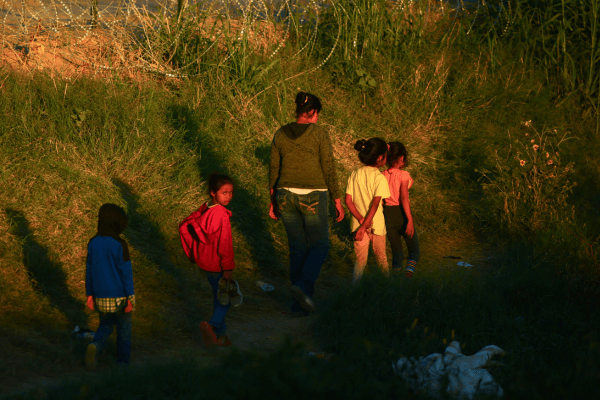When Inés Velásquez-McBryde, co-pastor of The Church We Hope For in Monrovia, Ca., heard President Joe Biden refer to an undocumented immigrant as an “illegal” during his State of the Union address on March 7, she said it was shocking, but no surprise.
“Calling immigrants ‘illegal’ is shameful, but people keep doing it,” she said. Though Biden later said he regretted the remark, Velásquez-McBryde said “the president knows better than that.”
The language around immigration can vary widely in intensity and interpretation. But with the number of people seeking humanitarian protections in the U.S. rising to record highs — making it a top concern among voters as November’s elections approach — powerfully charged depictions and descriptions of migrants have escalated.
And according to a recent Pew Research Center survey, religious Americans differ widely on how they refer to the increase in arrivals at the border. While only 45 percent of all U.S. adults say the large number of migrants is a “crisis,” majorities of white Christian groups — 70 percent of white evangelical Protestants, 64 percent of white Catholics, and 57 percent of white non-evangelical Protestants — feel that it is. In comparison, only 32 percent of Black Protestants and 27 percent of the religiously unaffiliated, or “nones,” say the situation at the border constitutes a “crisis.”
More than colloquial conundrum, Christian leaders like Velásquez-McBryde say the language we use determines the policies we support and the theologies we hold about people crossing borders.
The dehumanizing language of crisis, invasion, and natural disaster — referring to migrant “waves,” “swarms,” or “floods” — said Velásquez-McBryde, “causes anxiety, making bodies other than our own less valuable and painting migrants as dangerous, uncontrollable, and destructive.
“That language is based on a politics and theology of fear,” she said. To not be swayed by such discourse, Velásquez-McBryde said Christians should instead embrace expressions of love, compassion, and justice. “Kick the language based on fear and legality to the curb,” she said, “find a language based on dignity and humanity instead.”
Nonetheless, catastrophic language is increasingly mainstream, tripping off the tongues of politicians and media pundits in recent months, with everyone from The New York Times to the Texas Observer referring to a “crisis” at the border.
Both advocates for and those against immigration use language to undergird their positions and convey messages about the individuals arriving at U.S. borders. For example, on March 3 William Wolfe, the executive director of the ultra-conservative Center for Baptist Leadership, tweeted: “Every single illegal immigrant in America is a criminal.”
In an emailed statement that Wolfe later shared on X, he said the language he and his organization uses “will never be set by opinion polls.” Instead, referencing Title 8, Section 1325 of the U.S. Code, which refers to “any alien” who enters or attempts to enter the U.S. at any time or place other than as designated by immigration officers, or are apprehended while doing so, Wolfe said he uses terms like “‘illegal alien” and “criminal” intentionally. “What do we call people who commit crimes? Criminals,” he said. “Of course, there are limits to the language we use,” Wolfe continued, “Christians are called to speak the truth in love.
“But there is nothing unloving about using the proper legal term to describe illegal aliens who break our laws to enter America,” he said.
Research shows these language choices matter when it comes to influencing public opinion or dictating policy. According to a Pew Research Survey in 2019, people are more likely to support admitting people described as “refugees” over those described as “immigrants.”
And according to a study by Cornell economist Milena Djourelova, when the Associated Press banned the politically charged term “illegal immigrant” and other media outlets followed suit, it shifted opinions on immigration. Her statistics suggested individuals exposed to the ban through local media show significantly lower support for restrictive immigration policies.
“Partisan language can be used in a way that may influence what some people think about policy-relevant issues,” Djourelova told the American Economic Association. “Perhaps we should be careful about how we use language and think about what consequences it may have,” she concluded.
Carlos Rodríguez, founder of the nonprofit Happy Givers in Vega Baja, Puerto Rico, said the language used to talk about immigration comes from, and impacts, our theology too. “That, in turn, impacts our interactions with the people,” he said. Referencing Wheaton Old Testament scholar M. Daniel Carroll R., Rodríguez said if the conversation begins with whether people are “legal” or not, then it’s a very short conversation.
Instead of playing along with political or media games, Rodríguez urged people of faith to focus on the worth of the actual human being. “Whatever people are talking about on social media, whatever they are putting down in their op-eds, whatever you see on your screen, 100 percent of the migrants at the border were created in the image of God,” he said. “If you can recognize their humanity, you will see how much they have to give, that we can grow together if we welcome them.
“Crisis is the opposite word of what this is; it’s an opportunity and an invitation to welcome others as our worship. It’s as easy as that, even when it isn’t,” said Rodríguez.
Nonetheless, negative perceptions remain strong, especially among evangelicals. According to a 2024 Lifeway Research report, half of evangelicals (50 percent) say that the number of immigrants in the U.S. represents a loss of economic resources. Another third (37 percent) see the number of migrants as a threat to their security and to law and order, while 28 percent say that they are a threat to traditional American customs and culture. And according to Lifeway, the percentage who see immigrants as an opportunity to show love was reduced from 46 percent in 2022 to 38 percent in 2024.
It is impossible, Velásquez-McBryde said, to push back against all the voices speaking into peoples’ lives or change the discourse overnight. “With this being the number one issue on a lot of peoples’ minds, the reality is I have no control over what people hear or what they will say,” she said.
“Their minds are formed by the media and the media is predominately telling negative stories,” said Velásquez-McBryde.
What you can control, she said, is yourself. “We all need to educate ourselves, to learn to use language that doesn’t frame it in a way that is not accurate or inadvertently dehumanizes people,” she said. Instead, she encouraged Christians to speak a language of love, mercy, compassion, and inclusion. “Do your best to cultivate that ecosystem, and speak from it,” she said. “When you do that, you don’t have to be swayed by every news cycle or article.”
Rodríguez echoed Velásquez-McBryde. To that point, he said the best source for finding the right language about the topic lies with migrants themselves. “They are living documents, living people,” he said, “let them tell their stories, empower the conversation and teach us what language to use.”
The language is with la gente — the people — Rodríguez said.
Got something to say about what you're reading? We value your feedback!








